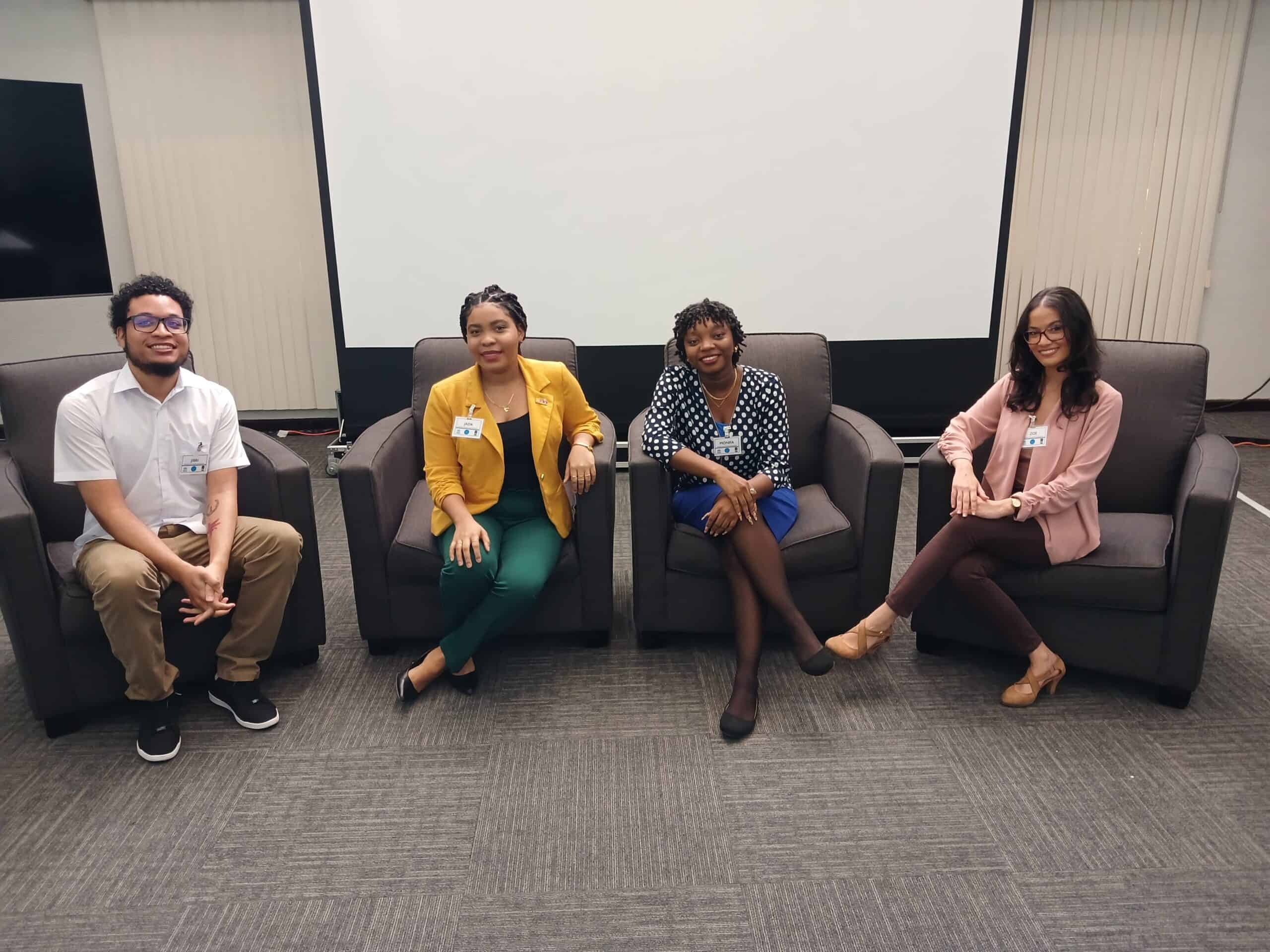
From L to R: Jibri King, Jada Mc Leod, Monifa Monderoy and Zoë Laydoo Missing: Acacia LaMaitre-Joseph.
Our BA Mass Communication student, Zoë Laydoo, shines the spotlight on the critical role that journalists play in the migrant, asylum–seeker and refugee plight.
Journalists’ Impact: The Refugee Story
Zoë Laydoo
Who is a refugee? What is the difference between refugees, asylum-seekers, and migrants? And how can journalists be more effective in helping them tell their stories?
These questions provided the basis for the ‘Reporting on Refugees and Asylum-seekers Workshop’ (24-25 October) in its goal to help guide journalists in reporting on the humanitarian issues around migration and forced displacement.
Five eager students from the Ken Gordon School of Communication, Creative and Digital Media sat riveted with pens in hand during the two-day workshop, hosted by the Media Institute of the Caribbean in collaboration with the United Nations High Commissioner for Refugees (UNHCR) and the Trinidad and Tobago Publishers and Broadcasters Association (TTPBA). We benefited from the wealth of information and comprehensive insight into the most pressing issues around forced displacement, including Trinidad and Tobago’s international protection environment; migration trends within the Caribbean; gender-based violence; education; correct terminology when reporting on forcibly displaced persons; and the responsible representation of women and children. It also addressed some of the benefits migration brings to Trinidad and Tobago. According to veteran journalist Wesley Gibbings, although we focus on the brain drain of skilled nationals migrating elsewhere, we have yet to appreciate the “brain gain” from the incoming migrants who can fill that gap.
A recurring theme and key takeaway for us emphasised that while the local media usually shines the spotlight on Venezuelan refugees and asylum-seekers, there are 42 different nationalities that make up the 30,619 refugees and asylum-seekers currently registered with the UNHCR in Trinidad and Tobago. Presenters thus encouraged us to diversify the storylines and start sharing the spotlight among those from the other 41 countries who often go unnoticed and unknown.
Profoundly eye-opening, the sessions put life into perspective for us, evoking a new appreciation and gratitude for the lives we are able to lead in Trinidad and Tobago: a country and culture that has, in fact, been built on migration. Certain discussions triggered the sobering realisation that these refugees and asylum-seekers value our country more than we do. We bemoan the crime situation, yet they come here for safety because what they have experienced in their home countries is far worse.
As journalism and mass communication students, we were also given invaluable opportunities to hear and learn from respected veteran journalists and experts, and network with others in the industry, who warmly welcomed and interacted with us. Experiences such as this are so crucial to our educational development as they take us beyond the classroom and help bring theory to life. Reflecting on our experience at the workshop, fellow students shared their thoughts:
“It was an exciting, thought-provoking, and memorable experience that, as a student journalist, I was thankful to have been exposed to.” – Jada McLeod
“Informative and refreshing. It exposed me to an aspect of journalism that I never had the confidence to explore before.” – Jibri King
“I appreciated being taught the correct terminology used when differentiating between refugees, asylum-seekers, and migrants, as well as the reminder that though they are characterised as such, they are still humans and need to be treated with the respect and empathy as such.” – Monifa Monderoy
Part of being a journalist is to act as a voice for the voiceless. As many refugees are unable to speak for themselves for a number of reasons, the onus of telling their stories falls to us. So, how do we do this? The workshop provided some simple but valuable advice: listen. Listen as a human. Listen, internalise, and put it into professional practice. Listen not to ask questions; rather, listen to understand, for understanding is the key to effectively and accurately telling refugees’ stories while protecting them and safeguarding their rights, according to the mandate of the UNHCR.
To learn more about the UNHCR’s work in Trinidad and Tobago, please visit: https://help.unhcr.org/trinidadandtobago/
Recent Comments